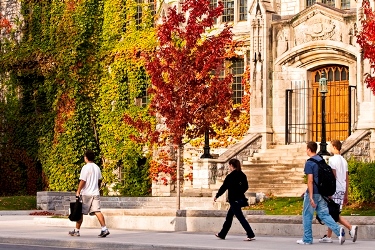Queen's holds position in Maclean's ranking
October 30, 2014
Share

Queen’s maintained its fourth-place position within the medical-doctoral category in this year’s Maclean’s university ranking, a spot it has held since 2011.
While holding its overall position, Queen’s moved up in terms of sponsored research income. The university earned $240,789 per full time faculty member, which boosted its standing to fifth position among medical-doctoral universities, up from ninth last year.
“Queen’s continues to be recognized as one of Canada’s leading universities,” says Daniel Woolf, Principal and Vice-Chancellor. “Although we are compared with much larger universities, Queen’s continues to punch above its weight when it comes to research, while at the same time delivering a transformative learning experience for our students. It is this strength as a balanced academy that sets Queen’s apart in Canada.”
McGill, the University of Toronto and the University of British Columbia made up the ranking’s top three medical-doctoral universities, all of which are significantly larger than Queen’s. The institutions have two to three times the faculty complement and enrolments ranging from 31,000 to 75,000 students. Queen’s has roughly 21,000 full time students.
Queen’s also moved up to fifth position nationally on the “highest quality” indicator in Maclean’s reputational survey of guidance counsellors, university officials, CEOs and recruiters, while holding its eighth-place position in the survey’s “most innovative” and “leaders of tomorrow” categories.
Although we are compared with much larger universities, Queen’s continues to punch above its weight when it comes to research, while at the same time delivering a transformative learning experience for our students. It is this strength as a balanced academy that sets Queen’s apart in Canada.
- Principal Daniel Woolf
Queen’s continues to lead the country for the highest student retention rate from first to second year, as well as for the proportion of students who graduate within seven years. The university is second in the medical-doctoral category for the proportion of its operating budget that goes towards scholarships and bursaries for students, while its students and faculty members are third and second respectively for the number of national awards they have won.
“Choosing to be a balanced academy and striving to excel equally at teaching and research is not an easy path for a university,” says Principal Woolf. “Queen’s continued success is due to the hard work and commitment of our exceptional staff, faculty, students and alumni.”
While Queen’s slipped this year in terms of its student/faculty ratio, average class sizes at Queen’s were changed only slightly from the previous year, with the average first- and second-year class size dropping to 82.3 from 84.6. Third- and fourth-year class sizes averaged 23.3, compared to 22.5 in the previous year.
The Maclean’s annual university rankings place universities into one of three categories (medical- doctoral, comprehensive and primarily undergraduate) to recognize differences in research funding, diversity of offerings and depth of graduate and professional programs. The rankings assess institutions based on a number of performance indicators related to faculty, students, resources, the library and reputation.